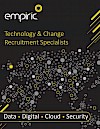How Businesses are Benefiting from the Internet of Things



While consumer applications of the Internet of Things (IoT) might receive the lion’s share of the press, the technology will arguably have a far greater impact in industry, driving corporate agility, making workflows more transparent and unlocking new efficiencies. Many organisations today look at IoT as providing a critical competitive advantage for the future.
Given this potential, there are predictions that the technology will soon become ubiquitous – with IDC forecasting that the manufacturing, transportation and utilities industries will collectively spend $347bn worldwide on IoT technologies in 2018. Meanwhile, The Eclipse Foundation predicts that there will some 55 billion IoT devices in use by 2025, increasing from just 9 billion in 2017.
The range of industrial applications of IoT technology is enormous and one of the key benefits of internet-connected sensors is the amount of data that they provide. This offers new insights into workflows and patterns of behaviour, which can then be optimised to deliver better results for the business – whether monitoring delivery vehicles, warehouse workers or production line processes.
Optimisation enables cost savings by reducing unnecessary maintenance, overstaffing and errors, and ensuring that resources and inventory can be deployed as effectively as possible. In a pilot programme, Airbus launched an initiative using sensors and wearables which was able to drive a reported 500% boost in productivity.
At the most fundamental level, building an IoT architecture will mean installing, managing and maintaining sensors and actuators. These are then connected to the internet via a gateway that aggregates incoming data streams and converts them for transmission. More advanced examples of these devices can incorporate digital security as well as outputting analytics – so the data could be passed on to the wider business while being immediately available within the facility. Considering the potentially vast amount of data that can be obtained, refinement may also occur onsite, with only key outputs and indicators being directed to a central data centre.
All this will require Solutions Architects and Research Engineers as well as Technicians on the ground. However, deriving the greatest possible benefit from IoT will require a cross-disciplinary team with expertise in a range of fields.


To take full advantage of the influx of data, it is crucial to have experienced data analysts on hand. It will be their task to ensure that the business is able to efficiently collect, process and structure these new datasets and to then direct how the business should respond. Making sense of this information is without doubt one of the most potentially valuable tasks facing the field of big data.
Moving the business to the cloud is arguably a prerequisite for the level of data processing enabled by IoT. That said, cloud migration is a process in itself and requires its own specialists to manage and oversee the project.
AI and machine learning can also be used to automate processes, not just receiving information from networked devices (ie processing data) but also dispatching commands. This might mean automatically processing orders and then sending designs to machines; or, more broadly, determining the pace of output across a factory. Put together, these applications enable the business to be far more nimble and to respond to changing market demand in close to real time.
IoT does have a bad reputation when it comes to security. While this is most true when it comes to consumer devices, creating connections where none existed before inevitably exposes businesses to increased risk and presents new potential attack surfaces.
In one case, a casino was reportedly hacked via an internet-connected fish tank – illustrating the risk posed by unsecured devices on a corporate network. That said, the threat can be minimised by following standard network security procedures, ensuring that all transmitted data is encrypted and using Public Key Infrastructure Security.
These factors will provide additional considerations for the digital security team and may also require new, specialised personnel (managing tasks such as logging all devices on the network, for example).


Businesses should also take a longterm view when considering using third-party services to avoid becoming locked-in; and when digitalising real world assets that may have a far longer lifespan than software equivalents. One only has to consider the fact that Britain’s nuclear submarines still run on a version of Windows XP (known as ‘Windows for Submarines’) to consider the potential issues.
Deploying IoT technologies at scale will also require buy-in from the C-level to ensure that the project has the resources that it needs, as well as the full support of the business. Hiccups have the potential to be expensive and, given that the programme sets out to reset organisational processes, may disrupt workflows and output if interrupted.
Given the interlinked nature of these tasks and the challenge of simultaneously hiring across multiple disciplines, high-level planning, led by experts, is needed from the outset. While efforts can be managed on a piecemeal basis, it will be far faster and more effective to approach the programme as a broad-based digital transformation initiative.
While there may be a range of challenges to overcome in launching an IoT initiative, the potential benefits are enormous. What’s more, those who don’t engage are likely to lose their competitive edge over time. The key to successful IoT is: what is the end goal?
Implementing IoT data gathering across the business is expensive so knowing what you will do with all the information and knowing how this information can have a tangible benefit to the performance of the business will be key.

Empiric is a multi-award winning business and one of the fastest growing technology and transformation recruitment agency's specialising in data, digital, cloud and security. We supply technology and change recruitment services to businesses looking for both contract and permanent professionals.

Read more (pdf download)
Empiric are committed to changing the gender and diversity imbalance within the technology sector. In addition to Next Tech Girls we proactively target skilled professionals from minority groups which in turn can help you meet your own diversity commitments. Our active investment within the tech community allows us to engage with specific talent pools and deliver a short list of relevant and diverse candidates.
For more information contact 02036757777 To view our latest job opportunities click here.